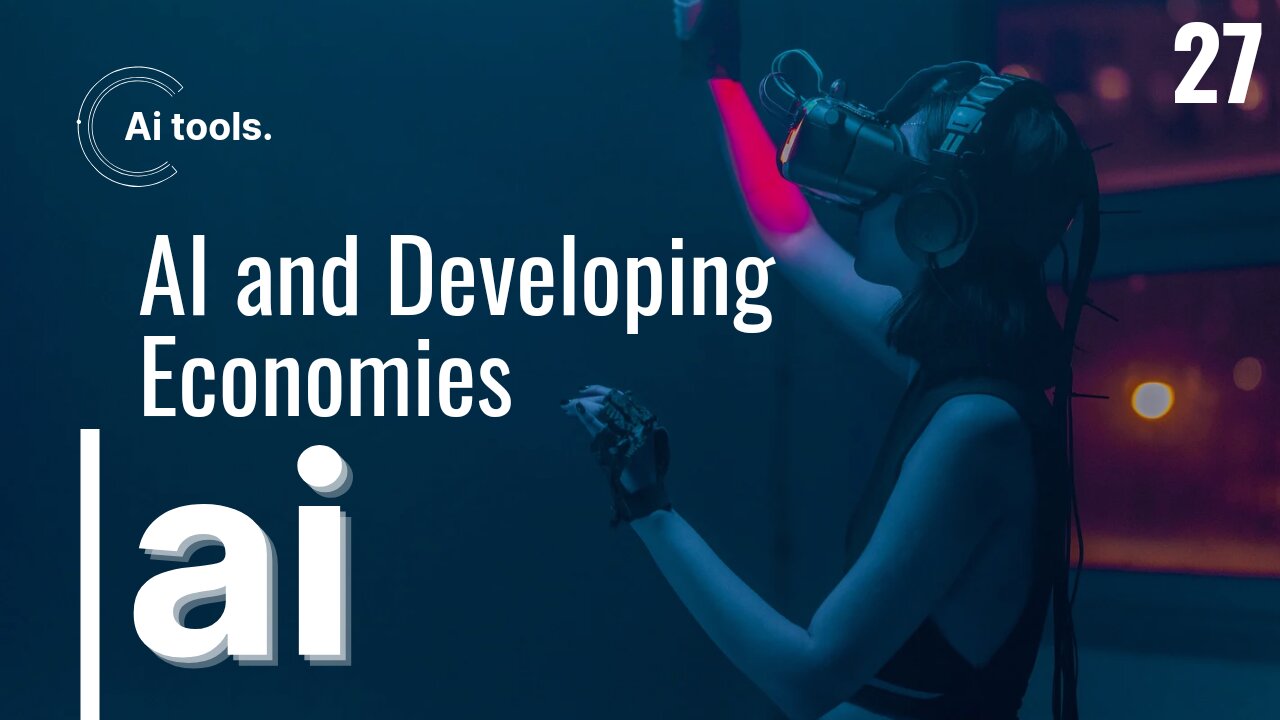Premium Only Content

AI and developing economies Part 27
Every time there is a major technological disruption such as of AI, it gives us a chance to remake the world. AI is a very advanced technology, yes affecting both developed economies and developing economies. So, how could we make sure that even as AI creates tremendous wealth, that it uplifts all nations? Let's take a look. There's been a fairly predictable roadmap, almost a ladder, that many developing economies have successfully executed in order to help the citizens gain skills and climb to higher levels of wealth. All the nations started off with lower-end agricultural products, exporting crops, and then moved to low-end textile manufacturing, such as clothing manufacturing. Then as a population starts to gain a bit more wealth, become a bit more healthy, move on to low-end components manufacturing, such as making less expensive plastic parts. So, then moving on to low-end electronics manufacturing, to higher-end electronics manufacturing, maybe to automotive manufacturing, and so on. There's been this step-by-step progression by which developing economies can hope their citizens gain skill and become developed economies. One of the problems that AI could cause is that, a lot of the lower rungs on the ladder are particularly susceptible to automation through AI. For example, as factories become more automated, or as agriculture becomes more automated, there may be less needed and therefore lesser opportunities for large members of a population of some of these developing economies to get onto the lower rungs of the economic ladder from which they would then climb up. So, if we're knocking out some of the lower rungs of the ladder through AI, through AI providing automation on steroids, then it is incumbent on us to see if AI can also create a trampoline to hope some developing economies jump onto the trampoline and bounce maybe even more quickly to the highest rungs of this ladder. With the rise of earlier waves of technology, many economies have shown that they can leapfrog developed economies and jump straight to a more advanced technology. For example, here in the United States most of us had landlines. Phones that were connected via wire to the wall. Because so many of us had landline phones, that actually took a while to transition to wireless mobile phones. In contrast, many developing economies including India and China ,but many others as well, didn't bother to build nearly as many land lines, but skip straight to mobile phones. So, this was a leapfrog where developing economies jumped straight over the earlier generation of technology and didn't bother to lay so many physical cables at every person's house and instead jumped straight to mobile phones. We're seeing a similar thing with mobile payments where many developed economies have a mature credit card system and that actually is slowing down their adoption of mobile or cell phone payments compared to some developing economies which do not already have entrenched incumbents in the credit card industry. I'm also seeing rapid adoption of online education in developing economies. In countries that have not yet built all the many many physical schools and universities that they need, many educational leaders and governments are seeking ways to more quickly embrace online education compared to some of the developed economies that have this built-up physical infrastructure for in-person education. While developed economies are also rapidly embracing all of these technologies, one of the advantages of developing economies is that without an entrenched incumbents system, perhaps there are areas that they could build even faster. The US and China are leading, and the UK and Canada, and a few other countries also have vibrant AI communities. But because AI is still so immature today, I think all AI communities are still immature. This means that even though AI is creating tremendous economic value, most of the value to be created is still off in the future. This gives every nation an opportunity to be a large part of creating this value that hasn't been created yet, and even capturing a large piece of it. So, I hope every nation can figure out how to effectively use AI to continue to help his citizens. My advice to developing economies is to focus on the AI to strengthen a country's vertical industries. For example, I think most countries today should not try to build their own web search engine. There are already great web search engines and that was last decades competition. Instead, if a country has a very strong vertical industry in say coffee bean manufacturing, then that country is actually uniquely qualified to do work in AI for coffee manufacturing and building AI for coffee manufacturing will even further strengthen what that country is already good at. So, rather than needing for every country to compete with the US and China on AI in general, I would advice most countries to use AI to strengthen what that country is good at and what that country wants to do in the future. Finally, public-private partnerships, meaning governments and corporations working together, can really help accelerate a vertical industry's AI developments. In highly regulated sectors, ranging from healthcare to transportation like self-driving cars to finance, there are certain outcomes that we want and certain outcomes that we don't want. Governments that are thoughtful about crafting derived regulations to protect citizens while at the same time enabling the adoption of AI solutions to these industries, will see faster local economic growth as well as faster technology development within their country. Finally, developing economies should invest in education because AI is still so immature. There's still plenty of room for every nation to learn more about AI, maybe even build up its own AI workforce and participate in a significant way in this AI powered world that we're building. In moments of technological disruption, leadership matters. Here in the United States, we once trusted our governments to put a man on the moon and it worked. With the rise of AI, it creates a space, and in some countries a need for leadership, whether in the government levels, or in companies, or in education to help a country enter the AI era and embrace and adopt AI to keep on lifting up its citizens, and perhaps even keep on lifting up other people worldwide. In this video, we've touched briefly on the issue of AI and jobs. This is an important topic that is widely discussed in many countries right now. Let's go on to the next video, to take a deeper look at AI and jobs.
-
 8:09:50
8:09:50
Dr Disrespect
17 hours ago🔴LIVE - DR DISRESPECT - MARVEL RIVALS - GOLD VANGUARD
202K33 -
 1:15:00
1:15:00
Awaken With JP
16 hours agoMerry Christmas NOT Happy Holidays! Special - LIES Ep 71
219K186 -
 1:42:21
1:42:21
The Quartering
17 hours agoTrump To INVADE Mexico, Take Back Panama Canal Too! NYC Human Torch & Matt Gaetz Report Drops!
172K110 -
 2:23:15
2:23:15
Nerdrotic
17 hours ago $14.19 earnedA Very Merry Christmas | FNT Square Up - Nerdrotic Nooner 453
129K12 -
 1:14:05
1:14:05
Tucker Carlson
17 hours ago“I’ll Win With or Without You,” Teamsters Union President Reveals Kamala Harris’s Famous Last Words
228K378 -
 1:58:31
1:58:31
The Dilley Show
17 hours ago $36.58 earnedTrump Conquering Western Hemisphere? w/Author Brenden Dilley 12/23/2024
170K50 -
 1:09:59
1:09:59
Geeks + Gamers
18 hours agoSonic 3 DESTROYS Mufasa And Disney, Naughty Dog Actress SLAMS Gamers Over Intergalactic
115K21 -
 51:59
51:59
The Dan Bongino Show
19 hours agoDemocrat Donor Admits The Scary Truth (Ep. 2393) - 12/23/2024
931K3.12K -
 2:32:15
2:32:15
Matt Kohrs
1 day agoRumble CEO Chris Pavlovski Talks $775M Tether Partnership || The MK Show
144K36 -
 28:23
28:23
Dave Portnoy
1 day agoDavey Day Trader Presented by Kraken - December 23, 2024
174K45